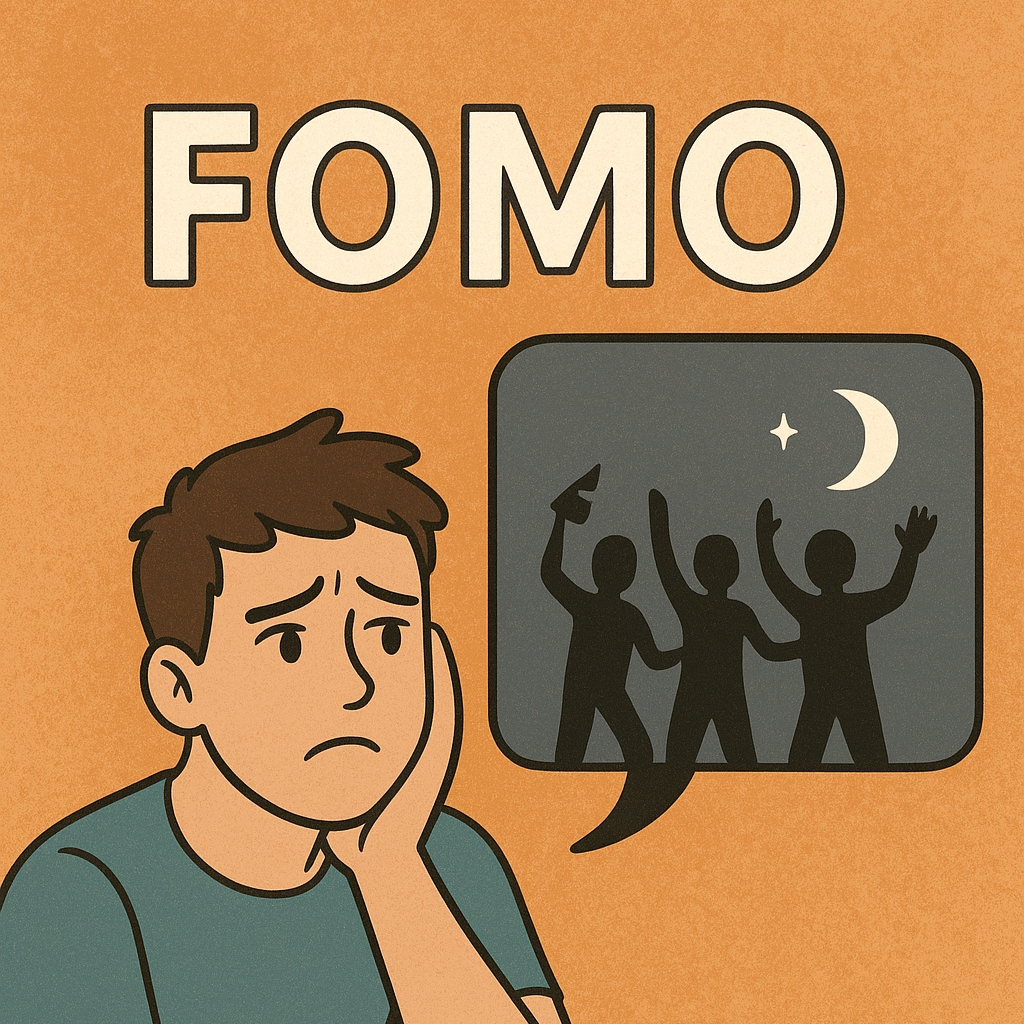FOMO Exposed: How Anxiety & Social Media Are Stealing Your Life
We've all been there. You're scrolling through Instagram at midnight, seeing friends at a party you didn't attend, a coworker's promotion announcement, someone's picture-perfect vacation. Your stomach tightens. That nagging voice whispers: Are you falling behind? Is everyone else living better than you?
Welcome to FOMO—the Fear of Missing Out. And you're not alone. According to research, as many as 69% of Americans have experienced FOMO at some point in their lives. It's not a personal weakness or a character flaw. It's a real psychological state, and it's stealing your peace, your presence, and your purpose.
What Is FOMO Really?
FOMO goes deeper than just social media anxiety. According to psychological research, FOMO is "a sense of apprehension that others might be having rewarding experiences from which you feel excluded."
It taps into primal ancestral fears that once kept us alive:
Fear of exclusion: Being left out of the tribe meant survival risk
Fear of inadequacy: Am I enough? Do I measure up?
Fear of comparison: Why them and not me?
These aren't modern problems. They're ancient, hardwired fears that social media has weaponized. The issue is that apps and platforms are engineered to exploit this. Your attention isn't a feature—it's the product being sold.
The Social Media Illusion
One of the biggest problems with social media is that we're comparing our behind-the-scenes with everyone else's highlight reel.
What you're not seeing:
The 50 failed attempts before the one perfect shot
The arguments between the couple in the photo
The depression between vacation posts (many people post photos on rainy days when they're feeling low)
The debt financing the lifestyle
The relationships that look perfect on the outside but are broken behind closed doors
People curate snapshots of success. They show you the moments selected from thousands. They don't show the fights. They don't show the relationship problems. They don't show the cost.
Meanwhile, your brain is making a simple calculation: Their life looks better than mine. I'm missing out. I need to fix this.
The Biology of the Trap
Here's how the dopamine cycle works:
You see someone else's achievement
Your brain releases dopamine—a small hit of pleasure
Your reward circuitry craves more
You scroll again, seeking another hit
Each scroll creates more comparisons, more dopamine hits
Suddenly, you've lost an hour
Your anxiety is higher, and you feel worse about yourself
This is doom scrolling, and it's by design. Companies spend millions optimizing every notification, every color, every pause to keep you engaged. The system wants you unsettled because unsettled people scroll more, buy more, share more, and stay engaged longer.
The Deeper Problem: We're Losing Connection
The real tragedy isn't that we're on our phones. It's what we're sacrificing while we are.
We're scrolling instead of having dinner with family. We're recording moments instead of experiencing them. We're performing lives instead of living them. We're becoming spectators in our own stories.
Studies have shown that social media use is linked to anxiety, depression, sleep disruption, weakened immune response, impaired decision-making, and decreased life satisfaction. But here's what gets overlooked: quality relationships matter infinitely more than follower counts. A small group of genuine friends will always be more meaningful than 5,000 followers.
Breaking Free
Breaking Free: Practical Strategies
The good news? FOMO is treatable, manageable, and escapable. Here's how to reclaim your life:
Audit Your Triggers
When you feel FOMO, ask yourself: What triggered it? What app? What person? What time of day? What need is FOMO trying to fill—connection, validation, or purpose? Write it down. Understanding your patterns is the first step to changing them.
Set Boundaries
A 2021 study found that limiting social media to 30 minutes a day significantly reduces FOMO and loneliness. Set a timer. Use your phone's built-in app limits. Create phone-free zones during meals and hangouts.
Practice Radical Presence
During meals, put your phone away. Taste your food. Notice textures and flavors. During conversations, look people in the eyes. Listen to understand, not to respond. These small acts rewire your brain toward presence instead of distraction.
Cultivate Gratitude
Every morning, write down three specific things you're grateful for—not generic ones. Every evening, reflect on one moment where you were fully present. This rewires your brain to notice what you have, not what you're missing.
Focus on Your Own Game
When you're playing your game, you stop watching everyone else's. Define your purpose: What am I building? What impact do I want to have? When you ground yourself in your own calling, FOMO loses its power.
Build Real Connections
Prioritize quality over quantity. Spend time with people who bring value and purpose to your life. Put your phones away during hangouts. Have real conversations. This is where real connection happens.
Get Outside
Leave your phone at home when possible. Notice the sky, trees, and weather. Natural environments quiet the noise and remind you of what actually matters.
The Spiritual Dimension
Spiritually, FOMO is rooted in three lies:
The Lie of Envy: Someone else's success steals from you. The Truth: Blessings don't run out. Peace does. Someone else's win doesn't diminish yours.
The Lie of Distrust: God doesn't have a plan for me. The Truth: God always has a unique plan for you. You wouldn't be here otherwise.
The Lie of Scarcity: There's not enough to go around. The Truth: There's always enough. You want more because of greed, not need.
Consider the concept of eternal time versus clock time. Clock time creates anxiety—the constant pressure of hours, minutes, and deadlines racing against you. Eternal time is the peace of the present moment, where you realize you can't miss what's meant for you. Your pace isn't the wrong pace. Right now is the only moment that offers anything real.
The Real Issue: Rest Versus Laziness
Hustle culture tells us to work harder, sleep less, and grind constantly. Your worth equals your output. You can sleep when you're dead.
This is poison.
Rest isn't laziness—it's resistance. Your best work comes from a calm, focused mind, not a scattered, anxious one. If you push yourself too hard, you'll face burnout, anxiety, and broken relationships.
More is not always better. Progress requires rest.
Progress Over Perfection
Here's the hardest truth: Overcoming FOMO requires genuine change, not minor adjustments. You have to make intentional decisions about how you spend your time, who you spend it with, and what you're chasing.
This isn't about being perfect. It's about progress.
Start small. One night without your phone. One weekend offline. One day of boring contentment instead of exciting comparison. Build from there.
Replace the lies with truth:
"I'm falling behind" becomes "I'm exactly where I need to be for my growth."
"Everyone is better than me" becomes "I have unique strengths nobody else has."
"Why them and not me?" becomes "Their journey is different from mine, and both are valid."
The Bottom Line
You don't need to be everywhere. You don't need to see everything. You don't need to do everything.
What you need is to be fully present in your own life. To build real connections. To pursue your purpose. To appreciate what you have instead of obsessing over what you don't.
FOMO is real. But so is your power to break free from it.
The question isn't whether you can—it's whether you will.



